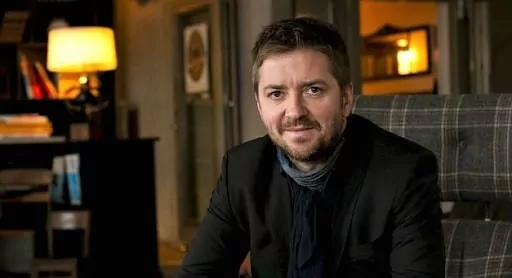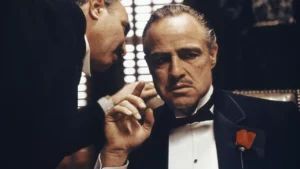
Atli Örvarsson is a renowned Icelandic composer who has worked on projects like Defending Jacob, The Edge of Seventeen, Eurovision Song Contest: The Story of Fire Saga and much more. We spoke to him about his latest project, Hitman’s Wife’s Bodyguard and how he approached the music and constructed the score for Salma Hayek’s character, among many other things.
Q. Hi Atli, I am Hardik Agrawal from The Movie Culture. How are you doing today?
Atli Örvarsson: I’m fine. Thanks. How are you?
Q. I’m great. So first of all, congratulations on Hitman’s Wife’s Bodyguard, it has been Front Runner at the box office. So congratulations on that. And I wanted to ask you how different was it working in Hitman’s Wife’s Bodyguard as compared to its predecessor, Hitman’s Bodyguard?
Atli Örvarsson: Well, the makeup of the film is a little bit different in terms of what kind of scenes are in there. I mean, it’s almost easier to talk about what was the same because obviously, it’s the same director, same actors, similar premise. So we decided to use a lot of the same themes, similar material, but I would say for me, the tone of the score, maybe went a little bit more to orchestra and action movie style. Because the first one had a lot of Ryan Reynolds and Samuel Jackson just going back and forth with banter. And a lot of that we scored with some simpler, blues sounding music, but just simply because there’s maybe a little bit more action in this film. It sounds slightly different. But the other thing that made the actual work completely different was the worldwide pandemic, because basically, I wasn’t able to go to the final mix for the film, I wasn’t able to really work with Patrick in person on the music. And we got quite lucky that we were able to record the orchestra here in Iceland in June of last year, because it was basically the only place in the world where you could do that at the time. So yeah, it was adventurous like the movie.
Q. So the music was actually recorded in Iceland and not in US?
Atli Örvarsson: It was recorded in Iceland and the UK to an extent but the big orchestra music was recorded in Iceland. It was a bit of a puzzle to get all the pieces together during Covid.
Q. This sequel was long awaited, and the music played a really integral role in making Hitman’s Bodyguard really epic and badass. So what were some of the things that you did fresh in the sequel which we hadn’t previously witnessed in the first movie?
Atli Örvarsson: Well, I mean, for me, the star of the show is Salma Hayek. So bringing her character into this film, as the name of the film implies, just changes the dynamic of it quite a bit. Then, of course, there’s a new bad guy. So we have a new bad guy and all of that and there’s still elements of the old. The first time I met the director, Patrick Hughes, we talked about the first film. Basically, we sat in my studio in LA for about four or five hours and listened to old blues records. So that’s where our conversation about music in general started. And I think there’s still an element of that in the music. But again, I think we went a bit more broader, more orchestral and big this time. So it’s a combination of new and old.
Q. So I wanted to come back to Salma Hayek, Hitman’s Wife’s Bodyguard introduces Salma Hayek’s character in the mix, and that must have been one of your priorities while working on the score. So how does the presence of her character change the dynamics of the music?
Atli Örvarsson: Well, you know, you’re always writing for the story. At the end of the day, the job for a film composer is to make the story stronger and help the director realize his vision. And perhaps the biggest thing is this idea that she and Samuel Jackson are on a honeymoon and they’re traveling around the Mediterranean. And that’s what sort of has the biggest effect on the color of the music. It just sort of changes the makeup. And what I mean by that is simply how many action scenes are there, how many talking scenes, etc. What’s really funny in the film is how Salma seems to be trying to outdo Samuel Jackson by having a foul mouth, and being a badass action character. So it’s quite funny.
Q. And obviously this movie actually wherein we visit Italy, and then we visit Greece, and all these different countries. So did that affect your process of making music?
Atli Örvarsson: It did a little bit. I mean I certainly used some elements from Mediterranean music, whether it’s pop music, for example, for the villain, you know, I use the Bouzouki, which is a Greek instrument. And, for their honeymoon music I’m playing an Italian Waltz so there’s certainly a geographical element to some of the music.
Q. I was also very curious about your first meeting with Patrick Hughes (Director) and how your involvement as a composer really begin in this franchise.
Atli Örvarsson: Well, I met him when they were working on the first movie, so it’s probably back in 2016, if I remember correctly, and they were just looking around for the right composer and Patrick met a few people and he heard some stuff that I had done. And I think it’s perhaps because I’ve background in playing rock and roll, and sort of blues and jazz, in some of the music that I’ve done for previous projects, its what he was looking for. And that’s why I think he chose to work with me. And also, quite frankly, a lot of this is just relationships and if you’re going to spend a lot of time with someone, you want to be able to enjoy their company. And I think that’s really a part of it and we enjoy the company. And so that’s why it all sort of worked out.
Q. You and Patrick Hughes had been thinking about this sequel for a very long time. So what’s it like working with him? And what was his vision for the score of Hitman’s Wife’s Bodyguard?
Atli Örvarsson: First of all, it’s great to work with Patrick, he’s so much fun. And he’s very looking for new ways to kind of surprise you, I think, both as a director and a person and to be honest, on the second one, he was pretty hands off and just let me do my thing. He was like just do what you need to do. And a part of it can be attributed to the COVID situation where it’s hard to collaborate and he’s very much a one on one kind of person. I think zoom is just not what works for Patrick Hughes. And I get it, it’s not a great way to communicate about being creative with somebody. So yeah, as is so often the case with sequels, they are just funnier, bigger and louder in every way. I think that’s really what we were going for.
Q. You are obviously an Icelandic music composer. And Iceland is home to some of the greatest composers, which include you, Late Jóhann Jóhannsson, Sigur Rós & Hildur Guðnadóttir. And I for one feel that they bring a really atmospheric and environmental vibe, but I want to know your opinion about the things that make Icelandic composers so special and so sought out for in the Hollywood spectrum.
Atli Örvarsson: Oh, dear. People often ask me, how is it possible that so many musicians and composers come out of such a small place? Because there’s only 350,000 people in this on this little island? And I don’t think there’s any one answer to it. But I think, to be honest, probably the biggest factor in it is the government investing in music education. And I think that’s just starting to bear fruit, but there’s also this attitude that has changed a lot through the years where everybody’s really open to working with each other. There used to be this divide between, say, classical musicians and pop musicians. And I think that divide has kind of been erased and everybody’s interested in working with everybody else. But also the people who play pop music and rock and roll or you know, popular music, a lot of them are very educated people in music as well. So there is this common bond of education and participation in music from a very young age. But then I also think that sometimes, you can’t really explain why the four members of The Beatles happened to be in Liverpool at the same time, you know, there’s sort of these moments in time when a lot of people come up at the same time in a similar place. I also credit Björk for opening up the world to Icelandic musicians who basically made people here believe that they weren’t just making music for Iceland, but for the whole world. So I could probably go on all day trying to find the reasons but these might be some of the factors.
Q. And any one of your favourite Icelandic composers that you would like to talk about?
Atli Örvarsson: You mentioned most of them, and I added Björk. Yeah, but there’s so many other amazing musicians that you’ve never heard of in Iceland. And that’s one of the things that sort of really struck me when I spent over 20 years in the United States and decided to change my living situation where I live, both here and in the states and when I started coming back to Iceland, I realized that people have heard about the main names you mentioned, and some others like Of Monsters and Men and GusGus, but there are so many other people in the scene and in every kind of music. I mean, it’s almost unfair to single people out because there’s so many. But it’s a phenomenon that such a small place can produce this many musicians. Maybe it’s also the weather’s so bad, we have to find something to do inside.
Q. You also worked on Defending Jacob, which has a completely different tonality than Hitman’s Wife’s Bodyguard. So what was it like working these two completely different projects, and that two back to back because they both sort of came during the same span of time, right?
Atli Örvarsson: Well, to be honest, there was another project in between, which was Eurovision, the Will Ferrell movie. So I was basically going from this really dark crime drama, to this really, really silly comedy, to an action comedy. All that happened in the span of about six months. So it was quite schizophrenic. But at the same time, I have to say, I loved working with defending Jacob, but it was really intense because I came on very late. So didn’t have much time to do the music. So it was a really compressed schedule. But also the subject matters is really dark. And to do it properly, you have to get into that Spirit then almost become one of the characters. So jumping onto something really silly like Eurovision was kind of a comic relief. And then Hitman’s Wife’s Bodyguard had sort of been lingering for a long time. I knew more or less that it was coming. I had a lot of time to think about it. You know, because Patrick and I had been talking about a sequel, almost since the week the first movie came out. So I knew it was coming. And in a way that’s obviously what I was best prepared for. So let me just say it was an intense time, the first six months of last year.
Q. As you just said, 2020 has been a really happening year for you, especially with the release of your debut album “You Are Here”. I listened to a few tracks, and it’s really something which reverberated with me. So, how long have you been working for that? And what were some of your biggest inspirations for your first solo album?
Atli Örvarsson: Well, I had been sort of thinking about doing something like this for a long time. And even when I first moved to Los Angeles, I had a catalogue of solo piano pieces that I was just playing for myself and writing for myself, and I was just so busy having a career and writing music for movies and stuff that I didn’t really give much thought. And then after I moved back to Iceland, my feeling about it changed quite a bit. And, so little by little, I just started focusing on actually making this a reality and making an album with my own music. People like Johan Johansson, who you mentioned, were an inspiration because, my career comes from starting in film, music, and then eventually leading to a solo album whereas, his career came from releasing solo albums, and that led to film music. So, people’s paths are different. But I mean, I just love his music and what I realized in a way was that all of a sudden, there was an interest in this kind of music that I maybe had been writing 20 years earlier, but I think that’s what happens when music just went on to Spotify. And it was transferred from physical medium to the internet, all of a sudden, you have access to these niche markets around the world. And when you put them all together, they’re actually very big markets, but before, if I’d released “You Are Here”, maybe my mom and three friends would have heard the album and that was it, you know.
Q. So finally, from Chicago Med to Hitman’s Wife’s Bodyguard, you have had a fantastic career. Could you tell us some of about some of the projects that you’ve been working towards in the near future?
Atli Örvarsson: There’s quite a few things coming up. And there’s one Icelandic film that’s coming out in the next few months, called Wolka. And I’m actually working on a documentary about Donald Trump and his family right now, which is a very interesting project. And yeah it’s fascinating, and then there’s a couple of movie projects in the works that I’m not supposed to talk about. And there’s also a new FBI international series, which is an addition to the the other two FBI shows that I work on. But with focus on an international department within the FBI. So that should be interesting. I don’t know if I’ll get to use some ethnic instruments on that, but we’ll have to see.
Q. Right. So thank you so much for speaking with me, Atli. I watched Hitman’s Wife’s Bodyguard and had a really silly and fun time with it. And a lot of it can be attributed to your score. It was tremendous. It was a pleasure interacting with you.
Atli Örvarsson: Yeah, Thank you so much for having me.
The Movie Culture Synopsis
Hitman’s Wife’s Bodyguard is available on Demand and Atli’s score shines in bringing out the raunchiness and the badassery of the movie.



